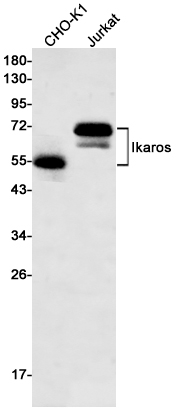-
Product Name
Anti-Ikaros Rabbit antibody
- Documents
-
Description
Ikaros Rabbit monoclonal antibody
-
Tested applications
WB, IHC-P, FC
-
Species reactivity
Human, Mouse, Rat
-
Alternative names
IK1; LYF1; LyF-1; CVID13; IKAROS; PPP1R92; PRO0758; ZNFN1A1; Hs.54452 antibody
-
Isotype
Rabbit IgG
-
Preparation
Antigen: A synthetic peptide of human Ikaros
-
Clonality
Monoclonal
-
Formulation
50nM Tris-Glycine(pH 7.4), 0.15M Nacl, 40%Glycerol, 0.01% sodium azide and 0.05% BSA.
-
Storage instructions
Store at 4°C short term. Store at -20°C long term. Avoid freeze / thaw cycle.
-
Applications
WB: 1/2000
IHC: 1/200
FC: 1/20
-
Validations

Western blot detection of Ikaros in CHO-K1,Jurkat cell lysates using Ikaros Rabbit mAb(1:500 diluted).Predicted band size:58kDa.Observed band size:50-70kDa.
-
Background
Swiss-Prot Acc.Q13422.Transcription regulator of hematopoietic cell differentiation (PubMed:17934067). Binds gamma-satellite DNA (PubMed:17135265, PubMed:19141594). Plays a role in the development of lymphocytes, B- and T-cells. Binds and activates the enhancer (delta-A element) of the CD3-delta gene. Repressor of the TDT (fikzfterminal deoxynucleotidyltransferase) gene during thymocyte differentiation. Regulates transcription through association with both HDAC-dependent and HDAC-independent complexes. Targets the 2 chromatin-remodeling complexes, NuRD and BAF (SWI/SNF), in a single complex (PYR complex), to the beta-globin locus in adult erythrocytes. Increases normal apoptosis in adult erythroid cells. Confers early temporal competence to retinal progenitor cells (RPCs) . Function is isoform-specific and is modulated by dominant-negative inactive isoforms (PubMed:17135265, PubMed:17934067).
Related Products / Services
Please note: All products are "FOR RESEARCH USE ONLY AND ARE NOT INTENDED FOR DIAGNOSTIC OR THERAPEUTIC USE"
